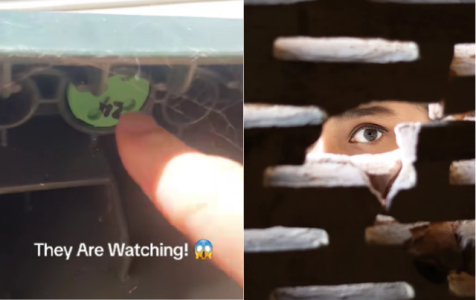‘Did you know the council is tracking what you throw out?’: Rubbish bin discovery sparks debate
By
Maan
- Replies 15
Most people don't give a second thought to what happens once their rubbish is collected—but what if your bin was keeping tabs on you?
A Melbourne resident has sparked debate after making a surprising discovery about his council-issued bin, leading to speculation about just how closely waste disposal is being monitored.
What he found—and the council’s response—has left many Australians questioning what really happens when the rubbish truck rolls in.
A Melbourne man claimed his local council was tracking his rubbish after finding what he believed was a monitoring device on his bin.
In a video posted on social media on 20 February, he pointed to a small chip on the underside of his council-issued bin from Casey Council in Melbourne’s southeast.
‘Did you know, the council are even tracking what you throw out?’ he wrote.
‘They've got a chip in here, and they're monitoring what you throw out in the truck.’
He later said he received a ‘naughty note’ from the council for failing to remove the lids from bottles before disposal.
‘So, someone's looking at the bins,’ he said.
‘Whether someone's snooping and looking in my bins or the truck is, I don't know. ‘
‘I'm getting a fair bit of hate from my last video. '
‘I think people didn't understand, this is a chip so it just registers your address...it weighs the bin, the truck weighs the bin and the truck films what comes out of your bin.’
The small chip appeared to be a Radio-Frequency Identification (RFID) tag, a device used by councils to link bins to specific properties, making it easier to track missing bins.
Some Australians claimed they had received warnings about incorrect bin use.
‘We have had multiple "warnings" put on ours for "incorrect use",’ one person said.
‘If they weren't monitoring, there'd be no warnings.’
However, a City of Casey spokesperson shared to the media on 22 February that the council ‘does not use and has no plans to use RFIDs or other tracking devices in any of its kerbside collection services’.
‘The City of Casey's bin inspection program involves a manual inspection for contamination in previously contaminated recycling or food and garden bins.’
Horsham Rural City Council, located in Victoria’s northwest, confirmed it does use RFID tags on organic waste and glass bins to ensure they are at the correct address before being emptied.
According to its website: ‘The RFID tag doesn't transmit all the time, it's only activated when it's in close proximity (a few centimetres) to the receiver on the truck.’
‘Most of the time it doesn't do anything as it doesn't have its own power source.’
Several councils across Australia have introduced RFID technology, with some residents arguing they were not properly informed.
In 2017, Randwick City Council addressed concerns about the technology after media speculation suggested the tags were being used for surveillance.
'A recent story by Channel 7 News would have you believe it's some sort of spying device.’
‘The truth is a lot less sensational.’
‘As many residents would be aware, it's been there for ten years, it saves council money and makes managing your rubbish more efficient.’
‘The tag is allocated to the property address where the bin lives.’
‘Each time it’s collected, Council’s garbage trucks record the bin tag number, the time of collection and the weight of the bin.’
In a previous story, new bin rules sparked debate as councils introduced a rating system for waste disposal.
The changes received mixed reactions, with some residents welcoming the initiative while others questioned its fairness.
Could these developments signal even stricter monitoring of household rubbish?

With councils using technology to manage waste collection, do you think RFID tags are a helpful tool or an invasion of privacy?
Let us know your thoughts in the comments.
A Melbourne resident has sparked debate after making a surprising discovery about his council-issued bin, leading to speculation about just how closely waste disposal is being monitored.
What he found—and the council’s response—has left many Australians questioning what really happens when the rubbish truck rolls in.
A Melbourne man claimed his local council was tracking his rubbish after finding what he believed was a monitoring device on his bin.
In a video posted on social media on 20 February, he pointed to a small chip on the underside of his council-issued bin from Casey Council in Melbourne’s southeast.
‘Did you know, the council are even tracking what you throw out?’ he wrote.
‘They've got a chip in here, and they're monitoring what you throw out in the truck.’
He later said he received a ‘naughty note’ from the council for failing to remove the lids from bottles before disposal.
‘So, someone's looking at the bins,’ he said.
‘Whether someone's snooping and looking in my bins or the truck is, I don't know. ‘
‘I'm getting a fair bit of hate from my last video. '
‘I think people didn't understand, this is a chip so it just registers your address...it weighs the bin, the truck weighs the bin and the truck films what comes out of your bin.’
The small chip appeared to be a Radio-Frequency Identification (RFID) tag, a device used by councils to link bins to specific properties, making it easier to track missing bins.
Some Australians claimed they had received warnings about incorrect bin use.
‘We have had multiple "warnings" put on ours for "incorrect use",’ one person said.
‘If they weren't monitoring, there'd be no warnings.’
However, a City of Casey spokesperson shared to the media on 22 February that the council ‘does not use and has no plans to use RFIDs or other tracking devices in any of its kerbside collection services’.
‘The City of Casey's bin inspection program involves a manual inspection for contamination in previously contaminated recycling or food and garden bins.’
Horsham Rural City Council, located in Victoria’s northwest, confirmed it does use RFID tags on organic waste and glass bins to ensure they are at the correct address before being emptied.
According to its website: ‘The RFID tag doesn't transmit all the time, it's only activated when it's in close proximity (a few centimetres) to the receiver on the truck.’
‘Most of the time it doesn't do anything as it doesn't have its own power source.’
Several councils across Australia have introduced RFID technology, with some residents arguing they were not properly informed.
In 2017, Randwick City Council addressed concerns about the technology after media speculation suggested the tags were being used for surveillance.
'A recent story by Channel 7 News would have you believe it's some sort of spying device.’
‘The truth is a lot less sensational.’
‘As many residents would be aware, it's been there for ten years, it saves council money and makes managing your rubbish more efficient.’
‘The tag is allocated to the property address where the bin lives.’
‘Each time it’s collected, Council’s garbage trucks record the bin tag number, the time of collection and the weight of the bin.’
In a previous story, new bin rules sparked debate as councils introduced a rating system for waste disposal.
The changes received mixed reactions, with some residents welcoming the initiative while others questioned its fairness.
Could these developments signal even stricter monitoring of household rubbish?
Key Takeaways
- A Melbourne man claimed his local council was tracking his rubbish after discovering a small chip on his bin, which he believed was monitoring waste disposal.
- The chip resembled an RFID tag, a technology used by some Australian councils to identify bins and track collection details, though Casey Council denied using such devices.
- Some Australians reported receiving warnings for incorrect bin use, supporting concerns about waste being monitored, while Horsham Rural City Council confirmed using RFID tags to verify bin locations.
- Randwick City Council previously clarified that RFID tags have been used for years to improve waste management, dismissing claims they were spying devices.
With councils using technology to manage waste collection, do you think RFID tags are a helpful tool or an invasion of privacy?
Let us know your thoughts in the comments.








